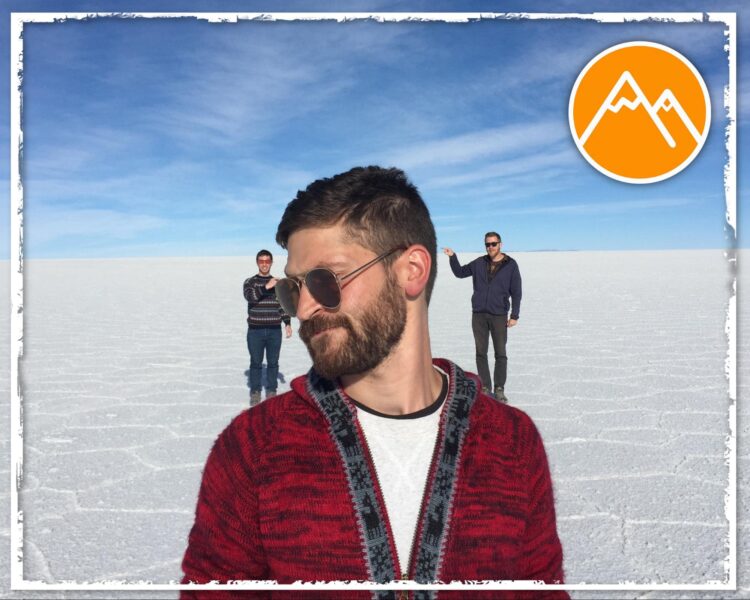
Gilad, author of this guest post and blogger at The Overthinker's Passport
Social media is weird. It feels like we all have this bizarre, adversarial love-hate relationship with it.
We love to post. We love the likes, we love to check in and see what our friends are up to…but we also can’t help but hate it.
We hate the desperation for likes; we hate how it makes us feel; we hate the picture-perfect lives other people seem to have.
We can’t seem to crack it. We want to unplug and appreciate the “now,” but we also want to feel included in what’s going on in the world.
We want to show off our lives to our friends when we feel that ours are empty and not good enough.
Is it just me, or does it feel like this brand new social media phenomenon is short-circuiting our brains? What is it doing to us?
This is a comparison culture. It’s pervasive, it’s intense, and it’s backing us into a corner. It keeps us stuck between a rock and a hard place.
Do we contribute, or do we unplug?
Do we choose to stay in the world of what’s happening or remove ourselves from it?
The answer is neither. Let me explain.
Table of Contents
What is Comparison Culture?
Comparison Culture is the phenomenon of social media pitting us against each other by making us repeatedly compare ourselves to the faked and curated versions of each other.
Our friends use Instagram, Facebook, & Twitter to create a “brand” of themselves that they want the world to see.
And then we take that brand, incorporate it into our worldview, and decide that our friends’ lives are far more exciting, happy and wholehearted than ours is.
Everyone’s life is distilled into a gallery version of a photoshopped supermodel: curated, filtered, contextless, and unrealistic. And the crazy part is that it's all fake.
How Does it Work?
Because social media is a pretty new invention, people are continually coming up with new and creative ways to use it to boost their brand & self-esteem.
Pictures that used to be spectacular or eye-catching quickly fade out of sight in the endless newsfeed scroll, so Instagrammers have developed innovative techniques to stand out. And they all feed the comparison culture beast.
Filtering
If there’s one Instagram technique I’m hugely guilty of, it’s filtering.
It used to take teams of people to touch up and airbrush photos for magazine covers, but only recently did we get the tools to do it ourselves.
We’ve become our own marketing agencies, and as a result, have warped the images of our lives to fit the brand we want them to convey.
We know that model influencers don’t have wrinkles, so we smooth ours out. We see those travel influencers don’t have cloudy days, so we boost the saturation.
The issue is because we all do it, the world looks far brighter and far more vibrant on our newsfeeds than it does in real life.
All of a sudden, a beautiful sunset or a mountaintop view seems dull and underwhelming compared to what we’ve seen in each other's newsfeeds.
The world, in reality, becomes a bit less interesting than the world online, and as a result, our world becomes a bit less attractive than other people’s worlds.
- Waterfall – no filter
- Waterfall – with filter
Example: Boosting your pictures' saturation to make them look more beautiful & vibrant than they are.
Cropping
Cropping is done to intentionally remove aspects of our pictures that don’t fit the brand or tone we’re trying to set. We all crop…and we do it shamelessly.
Ever try to take a picture of the Eiffel Tower or the Leaning Tower of Pisa, but those pesky tourists keep getting in the way?
A quick snip of the edges or a brief wait for that one millisecond of tourist-free space will do the trick. And boom.
All of a sudden, you’ve posted a beautiful, serene, iconic photo of one of the world’s wonders without context, and with all those annoying imperfections removed. But what does that to do us?
When we see a picture that’s been intentionally cropped to remove other tourists, garbage or debris, we strip that picture of its reality.
The crowds, the bustling nature of these places, those annoying things that live on the fringes of your pictures are part of the experience. When you remove them, you’re telling the world that they don’t exist.
So when I, for example, go to the Eiffel Tower or Leaning Tower of Pisa and expect it to look like it did in your picture, I’ll be disappointed and deflated from the crowds and imperfections that are inherent in the experience.
And the same will happen to you.
- Angkor Wat
- Crowds at Angkor Wat
Example: Taking a picture of an iconic travel site without flipping the camera to show the bazillion other tourists doing the exact same thing.
Posing
Posing is something that genuinely makes my skin crawl.
We’ve all seen it. People ask their friend to take a picture of them and then stand in front of a beach looking away mysteriously, hand in their hair as if to make it seem like it was a candid moment.
And then they filter and post it with some Maya Angelou quote to give the impression that they’re deep and reflective.
I think what bugs me in particular about posing is how transparently fake it is.
To see people freeze-frame while pretending to laugh or a person pretend to walk down Fifth Avenue in Manhattan makes me cringe.
It sells this horrible narrative that our actual lives aren’t good enough to take snapshots of. Instead, to get a picture where we look good while living our lives, we need to take 36 of the same photo and pick the one that looks best.
Fake candids and poses remove the spontaneity of pictures, and make it seem like other people’s lives are generally filled with laughter and devoid of awkward obstacles, when the reality is that we all struggle with the same issues.

Man posing
Example: Posting the headshot above with the caption: “Never make someone a priority when all you are to them is an option.”
Selective Posting
Selective posting is interesting because it’s less about what you do with your pictures and more about which photos you choose to share.
If you scroll through just about anyone’s Instagram feed, you’ll be bombarded with pictures of happy couples, adventurous hikes, beautiful sunsets, and gorgeous models.
You won’t see any pictures of arguments, unhappy marriages, loneliness, anxiety, or depression. That’s because people post specifically what they want the world to know about them.
Selective posting, in essence, fully removes the negative aspects of our lives in favor of the brands we want others to see about us.
We want to appear as the fun-loving model type who flies to Thailand on a whim, or the happy couple who travels the world together.
We never want people to know our more negative moments, like our breakups, boring jobs, or financial struggles.
We keep those things locked in a box just for us to see, so everyone else can still assume that our lives are as glamorous as we wish they were.
- Sunset
- Messy bed
Example: Posting a picture of a beautiful beach sunset and not posting a picture of moving into a new apartment.
How Does Comparison Culture Affect Us?
Comparison Culture, in my opinion, is a hugely problematic issue in our world today, and there are tons of studies that back that up.
Many psychologists have noticed that the more connected we are to our social media, the higher our incidences of depression and anxiety likely are.
There have been dozens of scientific studies that examine the psychological effects of internet addiction on our minds.
I think that there are three big reasons why Comparison Culture is dangerous.
FOMO (Fear of Missing Out)
For those who don’t know what FOMO is, it’s shorthand for the “fear of missing out.”
The fact that this word was only developed within the past few years is a huge testament to its relation to social media.
Fear of missing out begins by scrolling through our newsfeeds and seeing all the fun things people in the world are doing.
Now, did FOMO exist before Instagram? 100%.
But did it get worse since it became popular? Definitely.
Our world's pre-social media existed within our little bubble. We knew about what our circle of friends and family was doing, and that’s about it.
We never knew that a loose acquaintance was partying in Mykonos, or that some random influencer was out trekking in Argentina.
Our circle of comparison was much, much smaller.
Now, however, that we have people from around the globe within our daily sights, our circle expands globally and shows us every little thing we’re missing out on.
And with all of the fun things other people are doing, how can we not feel bad?
In addition to our wider circle of “friends,” the very fact that social media is a constant highlight reel of other people’s lives triggers the FOMO in us.
I can be doing some of the coolest hiking and traveling that the world has to offer, but if I see someone else doing the same thing with more friends or with a spouse, all of a sudden my experience seems diminished. It’s a lose-lose game.
The more you participate, the more deeply entrenched you get in that pesky trap.
Mental Contrarianism
One of the most irritating parts about social media to me is that I know that I’m being fed enhanced versions of people’s lives, but I buy into it anyway.
It’s the classic logic vs. emotion dilemma:
On a logical level, I know that what I’m seeing is a highly filtered, unrealistic version of a person's life.
But on a deeply emotional level, my envy is real, and I feel powerless to control it.
This drives me absolutely nuts because I actually am aware of the frustration I’m putting myself through, and still can’t seem to find a way to remove myself from it.
I think a lot of us feel this way: we know what we’re seeing is fake, but still, somehow believe deep down that there’s a lifestyle we’re missing out on.
We kick ourselves for buying into it while still buying into it anyway.
Inescapability
I think at the end of every argument surrounding social media is that one dead-end we all share: we’re not going to delete our Instagrams.
We’re not going to block our friends and family. We’re not going to magically tune out everything online that’s happening around us.
That’s just the direction the world is going, and it can be infuriating.
We’re essentially drinking the Kool-Aid daily despite knowing that it’s making us sick. Of course, that’ll have detrimental effects on our brains.

So What Can We Do About it?
I know at this point things seem rather bleak. Social media isn’t going away, and neither is its propensity to fuel Comparison Culture.
So, we have to ask ourselves, what can we do about it? How do we get these logical arguments to stick?
How can we drive home this notion that social media isn’t real, and our lives are perfectly great the way they are?
I’m not sure.
Cultivating a healthy relationship with Instagram is challenging because it requires you to cultivate a healthy relationship with yourself.
All the issues that we face surrounding social media are just symptoms of much bigger internal insecurities that we’re just not dealing with.
But, I think that there are some tools we can use to help get the ball rolling on self-love, and build enough momentum to make positive strides.
Ask Yourself Some Hard Questions
At the root of Comparison Culture, in my opinion, is this collective deep insecurity.
All of our shame, worries, and concerns jump into action when they see other people seemingly living their best lives.
The only way to tame those feelings is to find out why those pictures incite such a reaction from you in the first place.
So the next time you’re scrolling through your feed or posting a picture and feel that wave of envy bubbling up inside you, take a second and ask yourself some important questions.
- Why am I removing the bad parts of this picture?
- Why am I boosting the saturation or cropping out the crowd?
- What gaps am I trying to fill in this story that I’m unhappy with?
- What do I wish was true about this picture that isn’t?
These questions are difficult to ask and even more challenging to answer, but they’re essential because they’re the keys to the root of the problem.
If insecurities are a gunshot wound, lying about the quality of your life is a bandaid, and you can’t treat a gunshot wound with a bandaid.
This, to me, has been the most positive and beneficial way to handle my social media envy, not only because it reframes my relationship to it, but because it puts other peoples’ in context as well.
Add a Mental * to Your Newsfeed
When emotion trumps reason, sometimes you have to inject reason back into it.
This logical mental asterisk is easily the second most useful tool I’ve found when combating Comparison Culture.
Put a little * next to the images you see on your feed to remind yourself that this isn’t the whole picture.
This is the filtered, curated version of a person that they want you to see, and they’re posting these highlights purposefully to convey a particular lifestyle.
Keep that logical argument in your back pocket, and remind yourself daily that these people whose lives you envy feel the same way you do.
Recognize the Algorithm
When it comes to likes and comments, remember that Instagram uses an algorithm to calculate your visibility.
Therefore the quality of your posts generally has little to do with their popularity.
In short, pictures don’t necessarily get likes because they’re good.
They get them because of a complex & impenetrable algorithm that has everything to do with the Instagram platform and nothing to do with you.
It’s not your fault if your posts don’t get a lot of attention. It’s not because people don't like you, or that what you posted isn’t interesting.
It’s that Instagram controls what your followers see. For example, if you have 600 followers, it's unlikely that Instagram is only showing your pictures to 75 of them.
I can’t tell you how many bathroom selfies I’ve seen that get over 50,000 likes when my pictures from the tops of volcanoes get 100.
Practice removing yourself from the blame. It’ll take a lot of weight off your chest.
I Don’t Know
If I'm candid, I’m not too sure what the future holds for social media.
I think that people are beginning to catch onto its harmful effects, which will hopefully spur some change.
Instagram recently released a test version of a feature that wouldn’t show other people how many likes you’ve gotten on a post. That makes me hopeful.
However, we have to remember that social media is a recent experiment that we’re all participating in.
Never before have we been able to be our own modeling agencies and roll out our own red carpets.
We're in uncharted territory, so I don’t think we know how things will turn out.
I’d love to hear from you. What do you think? Do you think social media is as harmful as I do? What do you think we can do to fix some of the problems it has created?
Gilad is a traveler in his twenties and is the author of The Overthinker's Passport , a travel guide that aims to show nervous travelers and first-timers that travel isn’t just for the carefree nomadic types but can be fun and worthwhile for any kind of person — neurotic, meticulous, anxious or otherwise.
He’s traveled to almost 20 countries in the past three years, all with anxiety and OCD. His site is full of tips, recommendations, advice, and step-by-step guides he’s compiled from his travels so that he can help people plan a trip from the beginning all the way up to boarding the plane.
You can check out www.overthinkerspassport.com/ and follow his social media below: Instagram and Facebook
Planning a trip? Go Backpacking recommends:
- G Adventures for small group tours.
- Hostelworld for booking hostels.






